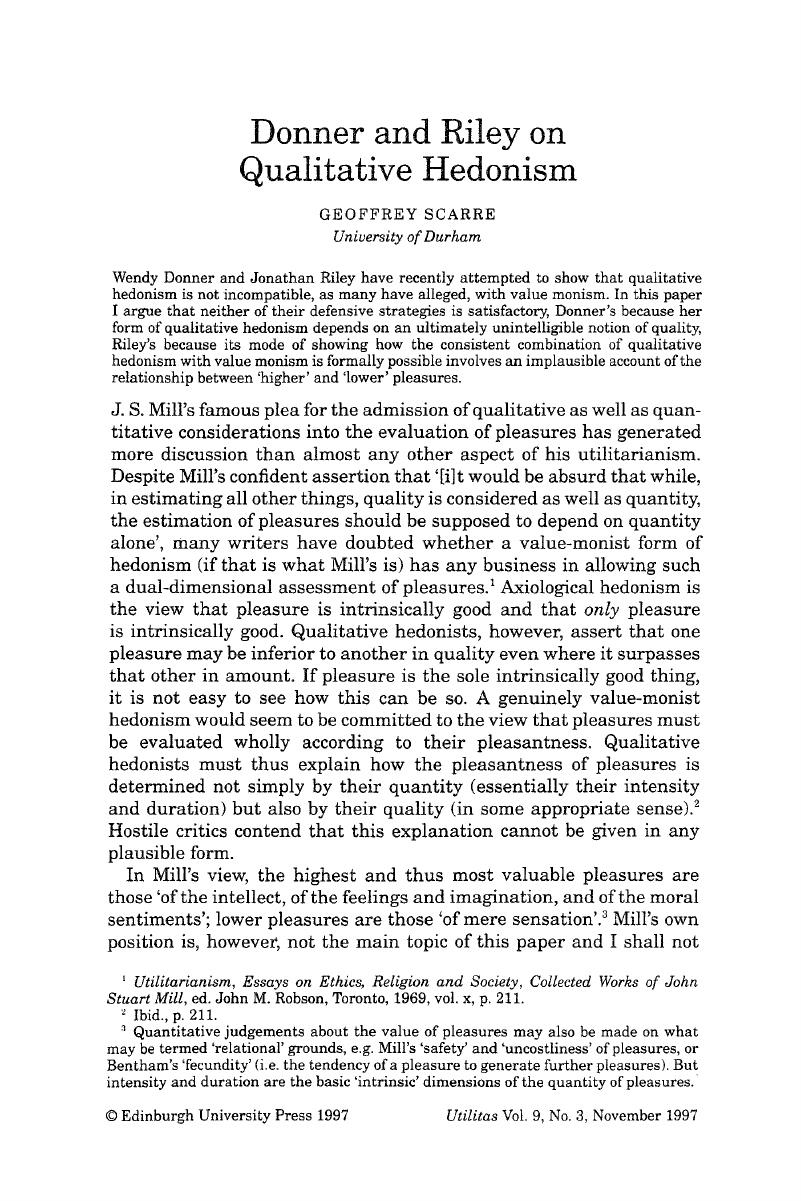Article contents
Donner and Riley on Qualitative Hedonism
Published online by Cambridge University Press: 26 January 2009
Abstract

- Type
- Discussion
- Information
- Copyright
- Copyright © Cambridge University Press 1997
References
1 Utilitarianism, Essays on Ethics, Religion and Society, Collected Works of John Stuart Mill, ed. Robson, John M., Toronto, 1969, vol. x, p. 211Google Scholar.
2 Ibid., p. 211.
3 Quantitative judgements about the value of pleasures may also be made on what may be termed ‘relational’ grounds, e.g. Mill's ‘safety’ and ‘uncostliness’ of pleasures, or Bentham's ‘fecundity’ (i.e. the tendency of a pleasure to generate further pleasures). But intensity and duration are the basic ‘intrinsic’ dimensions of the quantity of pleasures.
4 Riley presents his version of qualitative hedonism as a rational reconstruction of Mill's view and the most plausible form which the doctrine can take. But it is not wholly clear how far he subscribes to it himself. My criticism of ‘;Riley's position’ is therefore offered with the caveat that this may represent a position that Riley finds formally interesting, rather than one which he firmly accepts.
5 Donner, Wendy, The Liberal Self: John Stuart Mill's Moral and Political Philosophy, Ithaca and London, 1991, pp. 42–3Google Scholar. Subsequent page references to this work will appear in the text.
6 Bradley, F. H., Ethical Studies, Oxford, 2nd edn., 1927, pp. 119–20Google Scholar.
7 A System of Logic, 1973, CW, viii. 73.
8 Although Donner claims that quantity and quality are ‘good-making’ characteristics tout court (p. 41), it is not clear that she can really mean this, at least in regard to quantity. In the case of bad things it is better to have fewer of them than more. Two plague-germs are worse than one plague-germ, not better.
9 Significantly, Donner herself asserts that Mill had difficulty in distinguishing clearly between quantity and quality as normative properties (pp. 38–9). But the difficulty is hers, rather than Mill's, if my view is correct that Mill had no intention of positing quantity and quality as properties.
10 Riley, Jonathan, ‘On Quantities and Qualities of Pleasure’, Utilitas, v (1993), 292Google Scholar. Subsequent page references to this article will appear in the text (An earlier, briefer statement of Riley's, views can be found in his Liberal Utilitarianism, Cambridge, 1988, ch. 8)Google Scholar.
11 Utilitarianism, 211. Strictly speaking, Mill's last phrase should read ‘of no account.’ The quantity of a lower pleasure is a matter of indifference if no amount of it, as Mill claims, would render it preferable to a higher pleasure.
12 The dimension of comparison must be intensity, because a higher pleasure cannot be infinitely longer-lasting than a lower pleasure (assuming that no pleasure is over in an instant).
13 As Roderick Long, for one, has alleged. See his ‘Mill's Higher Pleasures and the Choice of Character’, Utilitas, iv (1992)Google Scholar.
14 Utilitarianism, p. 212.
15 Ibid., p. 213; my emphasis.
16 Ibid., pp. 211–13.
17 It is in fact hard to see why a rational hedonist should ever bother with lower pleasures if higher ones are infinitely more intense. Any pleasure will cloy in time: pleasure is subject to a principle of diminishing marginal utility. But if the Mill/Riley position is correct, someone who is satiated with a particular higher pleasure would be wise to replace it with another higher pleasure rather than a lower one.
18 It may be remarked that the proposition that we experience some pleasures as infinitely more pleasant than others does not imply that we experience some pleasures as infinitely pleasant; however implausible it is, it is not as implausible as that. Infinite divisibility is not a property only of infinite quantities. On the other hand, it is hard to see how we would register lower pleasures as pleasant at all if they were infinitely less intense than our (still finite) higher pleasures.
19 Bradley, pp. 119–20.
20 For all its faults, Donner's notion of quality as a property which comes in greater or lesser degrees accommodates the absence of a clear dividing-line between higher and lower pleasures better than the Mill/Riley discontinuity thesis.
21 Utilitarianism, p. 212.
- 11
- Cited by


